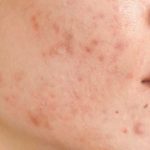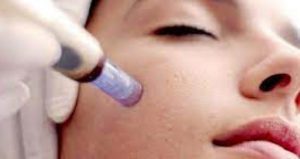
Breakouts are bad enough when they stick around for a week and then fade away. The only thing more frustrating is when your temporary pimple turns into a stubborn mark that just won’t go away, even after the blemish heals. Unfortunately, acne scars—sometimes called post-acne marks—are sometimes a side effect of pimples. They can come in all different shapes and sizes (and colors) and range in severity from barely noticeable to seriously severe. Some fade with little to no intervention, while others will only disappear with intensive professional treatment.
What Causes Scars from Acne?
Whether they’re flat, depressed, or raised, the basics of why an acne scar appears will remain the same. Certain types of acne penetrate the skin more deeply, and the result is that they damage the surrounding tissue. The actual blemish will go away with the right treatment or enough time, and your skin attempts to repair the damage.
One key component of this is your body producing collagen. This is a process that requires more precision than you might have thought. If the right amount of collagen isn’t produced (either too much or too little), a scar will form in the wake of your breakout. How much collagen is made will determine whether the resulting scar is depressed or raised.
 Why Depressed and Raised Scars Form
Why Depressed and Raised Scars Form
An excess of collagen will cause a hypertrophic or raised scar, while too little collagen will result in an atrophic or depressed scar.
 Why Flat Acne Scars Form
Why Flat Acne Scars Form
Acne marks are known as post-inflammatory hyperpigmentation (PIH) and occur when the skin over-produces melanin. Studies show inflammation induces damage to cells in the epidermis, which causes them to release large amounts of melanin. A common cause of the inflammation that leads to this chain of events is none other than acne. This is especially common for people of color and those with darker skin tones.
Will You Get Acne Scars?
Acne scars don’t appear after every breakout and aren’t dealt with by everyone. If you have inflammatory acne, the likelihood of scarring increases. Acne scars often develop after an inflammatory acne breakout that includes cysts and nodules. The reason being, this type of acne penetrates deep into the skin. The longer someone has this type of inflammatory acne, the more likely it is to leave a scar.
Like many other skin concerns, your genes can also play a role. Having a relative with acne scars could make you more prone to experiencing them.
While you can’t control your genes or dictate that you never want to get inflammatory breakouts, there is one thing that’s in your hands—quite literally—that can impact whether you get acne scars: pimple popping. If you squeeze, pop, or pick at your acne, which we know can be tempting, it causes inflammation and can lead to scarring. So, remember to keep your hands off.
 Treatments for Acne Scars
Treatments for Acne Scars
Breakouts are bad enough when they stick around for a while and then fade away. The only thing more frustrating is when your temporary pimple turns into a stubborn mark that just won’t go away, even after the blemish heals. Unfortunately, acne scars—sometimes called post-acne marks—are sometimes a side effect of pimples. They can come in all different shapes and sizes (and colors) and range in severity from barely noticeable to seriously severe. Some fade with little to no intervention, while others will only disappear with professional treatment.
Determining the best treatment for acne scars is dependent mainly upon the type of scar you have. Flat dark spots can be addressed with skincare products and ingredients shown to improve skin tone and texture, such as vitamin C. Face Fitness will put together a skincare routine designed to help reduce hyperpigmentation and dark spots left behind after a breakout.
Raised or indented scars, on the other hand, are more difficult to remove, and as such, are often addressed with professional in-salon procedures, such microdermabrasion, chemical peeling, or Collagen Induction Therapy (CIT) or Microneedling. When treating more advanced scaring, a series of professional treatments may be required to achieve the best results.
The estheticians at Face Fitness Skin Care have advanced training in acne scaring from Dr. Lance Setterfield, a pioneer in Microneedling. With over 30 years’ experience, we have successfully performed thousands of advanced treatments and we use only FDA approved, professional devices to ensure the highest standard of safety and achieve the best possible results.

So when it comes to treating your acne scaring, it’s critical to see an expert. Just like people, serious about getting in shape, work with a personal trainer, you need an expert esthetician to analyze your skin, and customize a treatment plan to address your particular type of scaring. Your esthetician will make adjustments in terms of treatments and products to keep minimizing the appearance of your acne scaring.
Clear skin from acne scaring is within reach!! The estheticians at Face Fitness Professional Skin Care are experts in skin care, especially clearing acne scaring! If you are interested in getting serious about your acne, please give us a call at (716) 631-0964 or Click Here.

Recent Comments